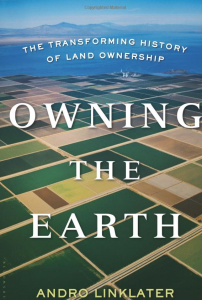
I have a longish review of Andro Linklater’s “Owning the Earth” at the Library of Law and Liberty. Linklater’s project was to offer a story of the development of land ownership in Western societies. Not the smallest of endeavours in itself. Land ownership is not an easy subject and requires extensive historical knowledge to be mastered. On top of that, Linklater plays with the history of political thought and, still not satisfied, finishes his book with a (rather unconvincing) chapter on the financial crisis.
Now, why do writers do this kind of thing? How come when you are writing a book you become willing to put down whatever thought you have in your mind, regardless of the subject you picked for yourself?
I suspect that, whenever we are playing with words, we’d do the world a better service if we cut all but 15% of what we have written ourselves. People tend to drag on when they’re speaking and when they’re writing. Excessive length makes an argument less focused, more repetitive, and ultimately less persuasive. All authors will tell you that: “cut unnecessary words!” And yet very few of us wordsmiths are capable of doing it with our own prose.

READER COMMENTS
Matt Moore
Jun 23 2015 at 8:35am
I have a longish review of Andro Linklater’s “Owning the Earth” at the Library of Law and Liberty. He offers the story of Western land ownership. Not the smallest endeavour. Land ownership is difficult and requires extensive historical knowledge to master. Also, Linklater plays with the history of political thought and, still unsatisfied, finishes (unconvincingly) with the financial crisis.
Why do writers do this? Why are you unconstrained by your chosen subject?
I suspect we’d do the world a service if we cut 85%. People drag on. Excess argument length increases repetition, and reduces focus and persuasion. All authors tell you: “cut unnecessary words!”. And yet few of us are capable of it.
Richard
Jun 23 2015 at 9:01am
Isn’t the obvious answer academic incentives? If you have one idea, you’re better off turning it into a book and three articles than just writing it down once.
Doesn’t apply in this case, but it often does.
NZ
Jun 23 2015 at 9:13am
I don’t know how it works in economic writing, but in tech writing (esp. software) the author’s ideas can usually be distilled into the first few chapters, but then publishers pressure the author to add more so that the book appears more substantial. So in a 12 chapter book, chapters 1-4 usually contain everything you really need to know, and then chapters 5-12 are more or less filler.
Carl
Jun 23 2015 at 3:21pm
Alberto! I couldn’t agree more. Perhaps my youthful taste for aphorisms and poetry have rather ruined things. Nearly everything I read seems pointlessly long-winded.
PMG
Jun 24 2015 at 2:56am
I had the same reaction to Linklater’s book: http://galesazreviews.blogspot.com/2015/01/owning-earth-transforming-history-of.html.
Alberto Mingardi
Jun 24 2015 at 5:53am
Thank you, @MattMoore! Nice way to prove the point.
Comments are closed.